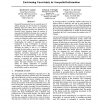Free Online Productivity Tools
i2Speak
i2Symbol
i2OCR
iTex2Img
iWeb2Print
iWeb2Shot
i2Type
iPdf2Split
iPdf2Merge
i2Bopomofo
i2Arabic
i2Style
i2Image
i2PDF
iLatex2Rtf
Sci2ools
141
click to vote
IJAR
2010
2010
Envisioning uncertainty in geospatial information
Geospatial Reasoning has been an essential aspect of military planning since the invention of cartography. Although maps have always been a focal point for developing situational awareness, the dawning era of Network Centric Operations brings the promise of unprecedented battlefield advantage due to improved geospatial situational awareness. Geographic information systems (GIS) and GIS-based decision support systems are ubiquitous within current military forces, as well as civil and humanitarian organizations. Understanding the quality of geospatial data is fundamental to using it intelligently. A systematic approach to data quality requires: estimating and describing the quality of data as it is collected; recording the data quality as meta data; propagating uncertainty through models for data processing; exploiting uncertainty appropriately in decision support tools; and communicating to the user the uncertainty in the final product. Bayesian reasoning provides a principled and cohe...
Related Content
| Added | 27 Jan 2011 |
| Updated | 27 Jan 2011 |
| Type | Journal |
| Year | 2010 |
| Where | IJAR |
| Authors | Kathryn B. Laskey, Edward J. Wright, Paulo Cesar G. da Costa |
Comments (0)

